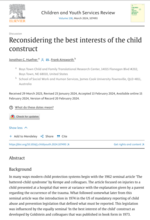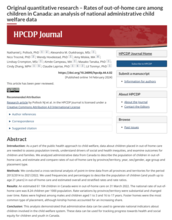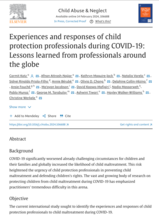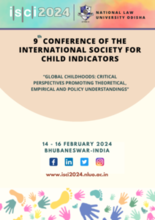Demographic Data
|
Sources: World Bank, UNICEF, UNDP HDR 2015, DHS 2013 |
Displaying 481 - 490 of 14551
The purpose of this CHIMES review and meta-analysis was to evaluate the effectiveness of interventions evaluated via randomized controlled trials (RCTs) for improving mental health and wellbeing outcomes for care experienced children and young people.
This article provides an overview of criticisms of the best interests construct and suggestions that the construct is a dated view about what is in a child’s best interests. There is a need for a new balance between explanations about child abuse and neglect (CAN) that takes account of poverty, social disadvantage, and the interests of children and their families.
Evidence suggests that providing out-of-home care to children is associated with high levels of compassion fatigue, possibly due to various work-related factors. This global systematic review examined the existing literature to determine the extent to which out of home care work results in compassion fatigue. To do so, it established which out of home care settings compassion fatigue has been measured in, how, and what factors contribute to developing compassion fatigue in this work.
This is a program evaluation of Agape Children's Ministry's Family Strengthening Programme in western Kenya that works to reunite children from the streets with their families.
This essential Research Handbook provides a multifaceted exploration of surrogacy and the law, examining a variety of critical yet under-researched perspectives including globalisation, power, gender, sexual orientation, genetics, human rights and family relations.
In Matters of Significance, Marinus van IJzendoorn and Marian Bakermans-Kranenburg draw on 40 years of experience with theoretical, empirical, meta-analytic and translational work in child development research to highlight the complex relations between replication, translation and academic freedom. They argue that challenging fake facts promulgated by under-replicated and under-powered studies is a critical type of translation beyond technical applications.
The authors analyzed administrative data from Canada to describe the population of children in out-of-home care, and estimate and compare rates of out-of-home care by province/territory, year, sex/gender, age group and placement type.
The current international study sought to identify the experiences and responses of child protection professionals to child maltreatment during COVID-19.
The ISCI 2024 Conference on ‘Global Childhoods: Critical Perspectives Promoting Theoretical, Empirical and Policy Understandings’ seeks to examine government policies and programs that have succeeded in promoting the well-being of children.
This perspective piece considers the impact on infant and perinatal health in the context of COVID-19 with particular emphasis on relational dynamics and attachment assessments, using a case study of a foster carer and her child in an out-of-home-care placement. Understanding these dynamics is crucial for safeguarding the well-being of both caregivers and vulnerable children during this challenging time.










